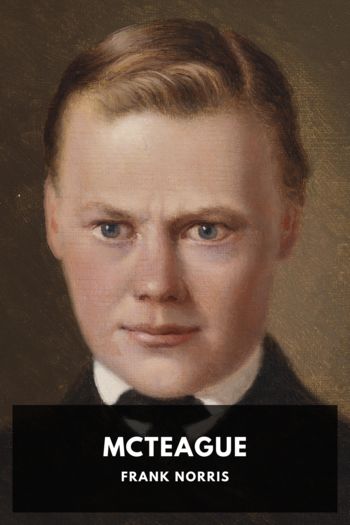McTeague, Frank Norris [polar express read aloud .txt] 📗

- Author: Frank Norris
Book online «McTeague, Frank Norris [polar express read aloud .txt] 📗». Author Frank Norris
A door hung with chenille portieres—a bargain at two dollars and a half—admitted one to the bedroom. The bedroom could boast a carpet, three-ply ingrain, the design being bunches of red and green flowers in yellow baskets on a white ground. The wallpaper was admirable—hundreds and hundreds of tiny Japanese mandarins, all identically alike, helping hundreds of almond-eyed ladies into hundreds of impossible junks, while hundreds of bamboo palms overshadowed the pair, and hundreds of long-legged storks trailed contemptuously away from the scene. This room was prolific in pictures. Most of them were framed colored prints from Christmas editions of the London Graphic and Illustrated News, the subject of each picture inevitably involving very alert fox terriers and very pretty moon-faced little girls.
Back of the bedroom was the kitchen, a creation of Trina’s, a dream of a kitchen, with its range, its porcelain-lined sink, its copper boiler, and its overpowering array of flashing tinware. Everything was new; everything was complete.
Maria Macapa and a waiter from one of the restaurants in the street were to prepare the wedding supper here. Maria had already put in an appearance. The fire was crackling in the new stove, that smoked badly; a smell of cooking was in the air. She drove McTeague and Old Grannis from the room with great gestures of her bare arms.
This kitchen was the only one of the three rooms they had been obliged to furnish throughout. Most of the sitting-room and bedroom furniture went with the suite; a few pieces they had bought; the remainder Trina had brought over from the B Street house.
The presents had been set out on the extension table in the sitting-room. Besides the parlor melodeon, Trina’s parents had given her an ice-water set, and a carving knife and fork with elk-horn handles. Selina had painted a view of the Golden Gate upon a polished slice of redwood that answered the purposes of a paper weight. Marcus Schouler—after impressing upon Trina that his gift was to her, and not to McTeague—had sent a chatelaine watch of German silver; Uncle Oelbermann’s present, however, had been awaited with a good deal of curiosity. What would he send? He was very rich; in a sense Trina was his protégé. A couple of days before that upon which the wedding was to take place, two boxes arrived with his card. Trina and McTeague, assisted by Old Grannis, had opened them. The first was a box of all sorts of toys.
“But what—what—I don’t make it out,” McTeague had exclaimed. “Why should he send us toys? We have no need of toys.” Scarlet to her hair, Trina dropped into a chair and laughed till she cried behind her handkerchief.
“We’ve no use of toys,” muttered McTeague, looking at her in perplexity. Old Grannis smiled discreetly, raising a tremulous hand to his chin.
The other box was heavy, bound with withes at the edges, the letters and stamps burnt in.
“I think—I really think it’s champagne,” said Old Grannis in a whisper. So it was. A full case of Monopole. What a wonder! None of them had seen the like before. Ah, this Uncle Oelbermann! That’s what it was to be rich. Not one of the other presents produced so deep an impression as this.
After Old Grannis and the dentist had gone through the rooms, giving a last look around to see that everything was ready, they returned to McTeague’s Parlors. At the door Old Grannis excused himself.
At four o’clock McTeague began to dress, shaving himself first before the hand-glass that was hung against the woodwork of the bay window. While he shaved he sang with strange inappropriateness:
No one to love, none to caress,
Left all alone in this world’s wilderness.
But as he stood before the mirror, intent upon his shaving, there came a roll of wheels over the cobbles in front of the house. He rushed to the window. Trina had arrived with her father and mother. He saw her get out, and as she glanced upward at his window, their eyes met.
Ah, there she was. There she was, his little woman, looking up at him, her adorable little chin thrust upward with that familiar movement of innocence and confidence. The dentist saw again, as if for the first time, her small, pale face looking out from beneath her royal tiara of black hair; he saw again her long, narrow blue eyes; her lips, nose, and tiny ears, pale and bloodless, and suggestive of anaemia, as if all the vitality that should have lent them color had been sucked up into the strands and coils of that wonderful hair.
As their eyes met they waved their hands gayly to each other; then McTeague heard Trina and her mother come up the stairs and go into the bedroom of the photographer’s suite, where Trina was to dress.
No, no; surely there could be no longer any hesitation. He knew that he loved her. What was the matter with him, that he should have doubted it for an instant? The great difficulty was that she was too good,





Comments (0)